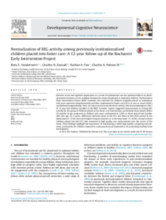The practice of institutionalizing abandoned or orphaned infants and children remains a common practice in many parts of the world, despite well-documented evidence of the physical and psychological harms that result. Institutional care is associated with social and cognitive deprivation as a result of high child-to-caregiver ratios or highly regimented schedules with extended periods where children are left alone. The Bucharest Early Intervention Project (BEIP) examined the outcomes for children who were originally placed in institutions; these children were randomized into two groups and followed longitudinally, with some being moved into foster care and others remaining in institutional care. This particular study reports on the brain electrical activity (electroencephalogram, or “EEG”) of 12-year-old children in this study, in order to examine the impact of movement to foster care after early psychological deprivation as a result of institutionalization. A previous, related study among 8 year-olds suggested an improvement in resting EEG activity among those children moved to foster care, particularly among children who were moved to foster care prior to 24 months of age.
The results revealed that, at 12 years old, children who were moved into foster care from institutions demonstrated continuing benefits according to their resting EEG activity, suggesting that the benefits observed among 8 year-olds moved to foster care continued several years later. The particular improvements observed on the EEGs are known as “beta band activity,” which has been associated with performance on tasks that require verbal and spatial working memory, motor performance, language processing, and processing emotional stimuli such as other people’s faces. This study highlights the important effects that moving away from institutionalization can have on a child’s brain development many years into the future, even among children who were previously exposed to early psychosocial deprivation.

